Related Research Articles
The Book of Judges is the seventh book of the Hebrew Bible and the Christian Old Testament. In the narrative of the Hebrew Bible, it covers the time between the conquest described in the Book of Joshua and the establishment of a kingdom in the Books of Samuel, during which biblical judges served as temporary leaders.
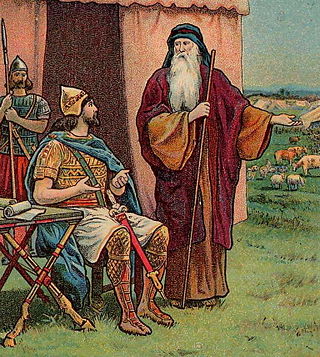
Samuel is a figure who, in the narratives of the Hebrew Bible, plays a key role in the transition from the biblical judges to the United Kingdom of Israel under Saul, and again in the monarchy's transition from Saul to David. He is venerated as a prophet in Judaism, Christianity, and Islam. In addition to his role in the Bible, Samuel is mentioned in Jewish rabbinical literature, in the Christian New Testament, and in the second chapter of the Quran. He is also treated in the fifth through seventh books of Antiquities of the Jews, written by the Jewish scholar Josephus in the first century. He is first called "the Seer" in 1 Samuel 9:9.

Bethel was an ancient Israelite city and sanctuary that is frequently mentioned in the Hebrew Bible.

Gideon also named Jerubbaal and Jerubbesheth, was a military leader, judge and prophet whose calling and victory over the Midianites are recounted in Judges 6–8 of the Book of Judges in the Hebrew Bible.

According to the Book of Judges, Deborah was a prophetess of the God of the Israelites, the fourth Judge of pre-monarchic Israel and the only female judge mentioned in the Hebrew Bible. Many scholars contend that the phrase, "a woman of Lappidot", as translated from biblical Hebrew in Judges 4:4 denotes her marital status as the wife of Lapidoth. Alternatively, "lappid" translates as "torch" or "lightning", therefore the phrase, "woman of Lappidot" could be referencing Deborah as a "fiery woman." Deborah told Barak, an Israelite general from Kedesh in Naphtali, that God commanded him to lead an attack against the forces of Jabin king of Canaan and his military commander Sisera ; the entire narrative is recounted in chapter 4.

Dan is an ancient city mentioned in the Hebrew Bible, described as the northernmost city of the Kingdom of Israel, and belonging to the tribe of Dan.

Gilgal, also known as Galgala or Galgalatokai of the 12 Stones, is the name of one or more places in the Hebrew Bible. Gilgal is mentioned 39 times, in particular in the Book of Joshua, as the place where the Israelites camped after crossing the Jordan River. The Hebrew term Gilgal most likely means "circle of stones". Its name appears in Koine Greek on the Madaba Map.
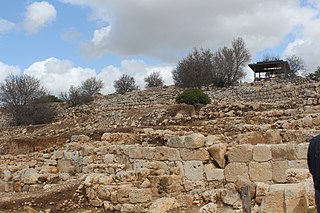
Shiloh was an ancient city and sanctuary in Samaria. According to the Hebrew Bible, Shiloh was one of the main centers of Israelite worship during the pre-monarchic period, before the First Temple in Jerusalem was built. After the Israelite conquest of Canaan, the Tabernacle was moved to Shiloh, and remained there during the period of the biblical judges.
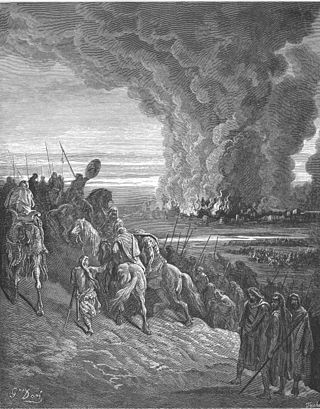
The Ai was a Canaanite city. According to the Book of Joshua in the Hebrew Bible, it was conquered by the Israelites on their second attempt. The ruins of the city are popularly thought to be in the modern-day archeological site Et-Tell.

The angel of the LORD is an entity appearing repeatedly in the Hebrew Bible on behalf of the God of Israel.
Ichabod is mentioned in the first Book of Samuel as the son of Phinehas, a priest at the biblical shrine of Shiloh, who was born on the day that the Israelites' Ark of God was taken into Philistine captivity. His mother went into labour due to the shock of hearing that her husband and Eli, her father-in-law, had died and that the Ark had been captured. He is also named later as the brother of Ahitub.
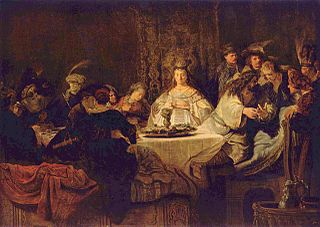
Samson's riddle is found in the biblical Book of Judges, where it is incorporated into a larger narrative about Samson, the last of the judges of the ancient Israelites. The riddle, with which Samson challenges his thirty wedding guests, is as follows: "Out of the eater came something to eat, and out of the strong came something sweet."

The episode of the Levite's concubine, also known as the Benjamite War, is a biblical narrative in Judges 19–21. It concerns a Levite from Ephraim and his concubine, who travel through the Benjamite city of Gibeah and are assailed by a mob, who wish to gang-rape the Levite. He turns his concubine over to the crowd, and they rape her until she collapses. After she dies from her ill treatment, the Levite dismembers her body and presents the remains to the other tribes of Israel. Outraged by the incident, the tribes swear that none shall give his daughter to the Benjamites for marriage, and launch a war which nearly wipes out the tribe, leaving only 600 surviving men. However, the punitive expedition is overcome by remorse, fearing that it will cause the extinction of an entire tribe. To ensure the survival of the Benjamite tribe while still complying with their oath, the Levites pillage and massacre the city of Jabesh-Gilead, none of whose residents partook in the war or in the vow, and capture its 400 maidens as wives for the Benjamites. The 200 men still lacking women are subtly allowed to abduct the maidens dancing at Shiloh.
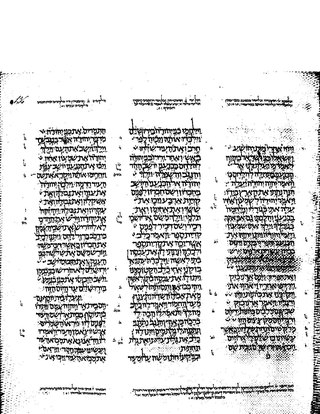
Judges 20 is the twentieth chapter of the Book of Judges in the Old Testament or the Hebrew Bible. According to Jewish tradition the book was attributed to the prophet Samuel, but modern scholars view it as part of the Deuteronomistic History, which spans in the books of Deuteronomy to 2 Kings, attributed to nationalistic and devotedly Yahwistic writers during the time of the reformer Judean king Josiah in 7th century BCE. This chapter records the war between the tribe of Benjamin and the other eleven tribes of Israel, belonging to a section comprising Judges 17 to 21.

Numbers 31 is the 31st chapter of the Book of Numbers, the fourth book of the Pentateuch (Torah), the central part of the Hebrew Bible, a sacred text in Judaism and Christianity. Scholars such as Israel Knohl and Dennis T. Olson name this chapter the War against the Midianites.
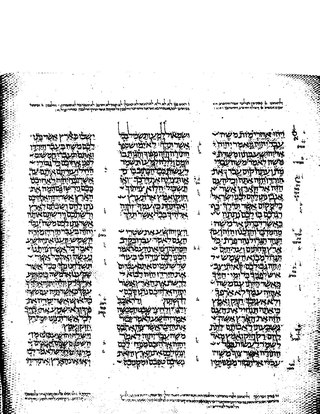
Joshua 24 is the twenty-fourth chapter of the Book of Joshua in the Hebrew Bible or in the Old Testament of the Christian Bible. According to Jewish tradition the book was attributed to the Joshua, with additions by the high priests Eleazar and Phinehas, but modern scholars view it as part of the Deuteronomistic History, which spans the books of Deuteronomy to 2 Kings, attributed to nationalistic and devotedly Yahwistic writers during the time of the reformer Judean king Josiah in 7th century BCE. This chapter records Joshua's final address to the people of Israel, that ends with a renewal of the covenant with YHWH, and the appendices of the book, a part of a section comprising Joshua 22:1–24:33 about the Israelites preparing for life in the land of Canaan.

Judges 2 is the second chapter of the Book of Judges in the Old Testament or the Hebrew Bible. According to Jewish tradition the book was attributed to the prophet Samuel, but modern scholars view it as part of the Deuteronomistic History, which spans the books of Deuteronomy to 2 Kings, attributed to nationalistic and devotedly Yahwistic writers during the time of the reformer Judean king Josiah in 7th century BCE. This chapter focuses on the military failure and apostasy of the Israelites following the introduction in the first chapter.
War in the Hebrew Bible concerns any military engagement narrated or discussed in the Hebrew Bible, also known as the Tanakh or Old Testament of the Bible. Texts about war in the Hebrew Bible are part of the broader topic of The Bible and violence. They cover a wide range of topics from detailed battle reports including weapons and tactics used, numbers of combatants involved, and casualties experienced, to discussions of motives and justifications for war, the sacred and secular aspects of war, descriptions and considerations of what in modern times would be considered war crimes such as genocide or wartime sexual violence, and reflections on wars that have happened, or predictions, visions or imaginations of wars that are yet to come.

Joshua 9 is the ninth chapter of the Book of Joshua in the Hebrew Bible or in the Old Testament of the Christian Bible. According to Jewish tradition the book was attributed to the Joshua, with additions by the high priests Eleazar and Phinehas, but modern scholars view it as part of the Deuteronomistic History, which spans the books of Deuteronomy to 2 Kings, attributed to nationalistic and devotedly Yahwistic writers during the time of the reformer Judean king Josiah in 7th century BC. This chapter focuses on the deception by the people of Gibeon to avoid annihilation by having a treaty with the people of Israel under the leadership of Joshua, a part of a section comprising Joshua 5:13–12:24 about the conquest of Canaan.

According to the Torah, the Tribe of Benjamin was one of the Twelve Tribes of Israel. The tribe was descended from Benjamin, the youngest son of the patriarch Jacob and his wife Rachel. In the Samaritan Pentateuch the name appears as Binyamīm.
References
- ↑ e.g. New International Version
- ↑ Jože Krašovec (2007). Svetopisemska lastna imena / Biblical proper names: Fonetika, etimologija, prevajanje in transliteriranje / Phonetics etymology, translation and transliteration. Založba ZRC. p. 74. ISBN 978-961-254-041-8.
- ↑ Text used in the Douai-Rheims 1899 American Edition of Judges 2:1
- ↑ Burney, C. F., The Book of Judges with introduction and notes, Rivingtons, London (1920)
- ↑ Cambridge Bible for Schools and Colleges on Judges 2, accessed 12 October 2016
- ↑ Amit, Hidden Polemics, pp. 119-120.
- ↑ Gomes, The Sanctuary of Bethel, p. 117.